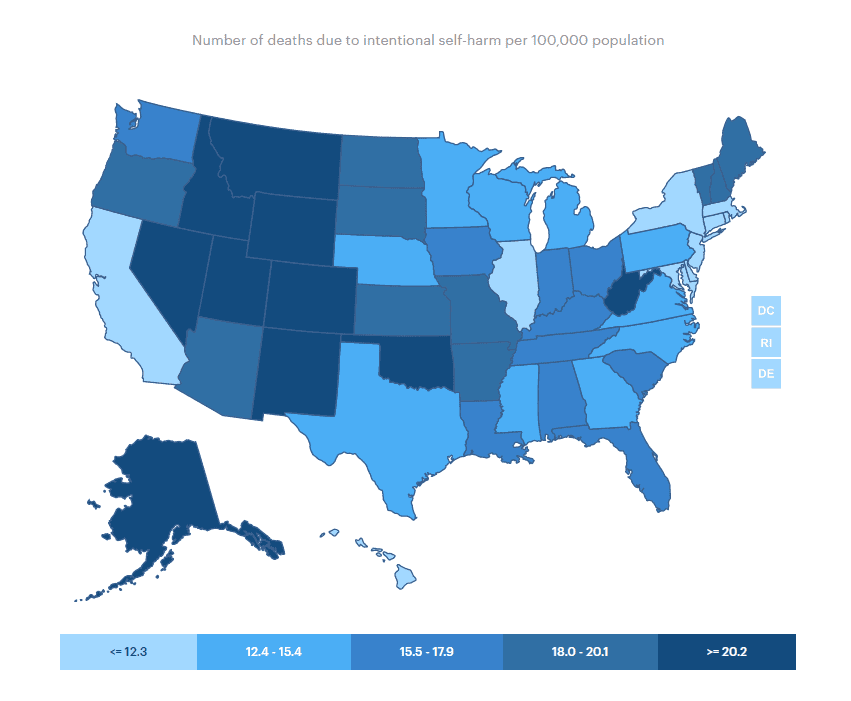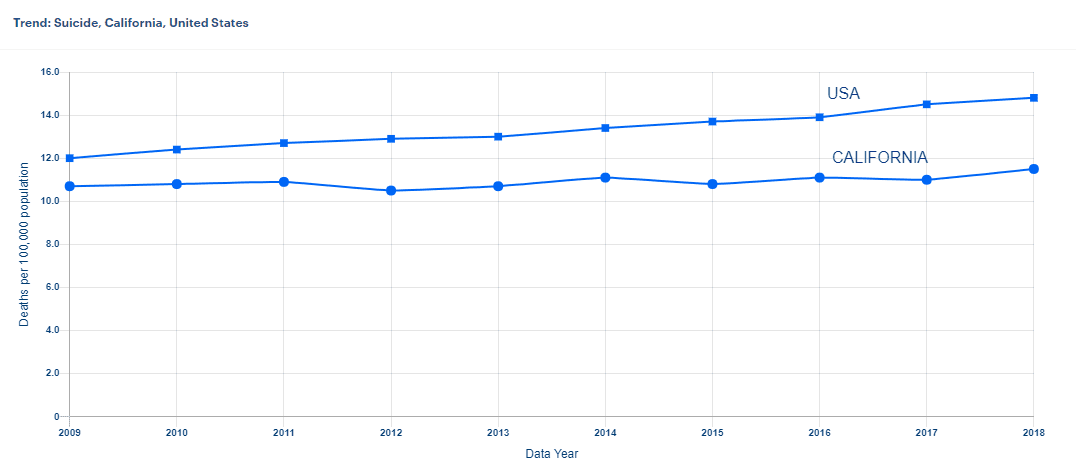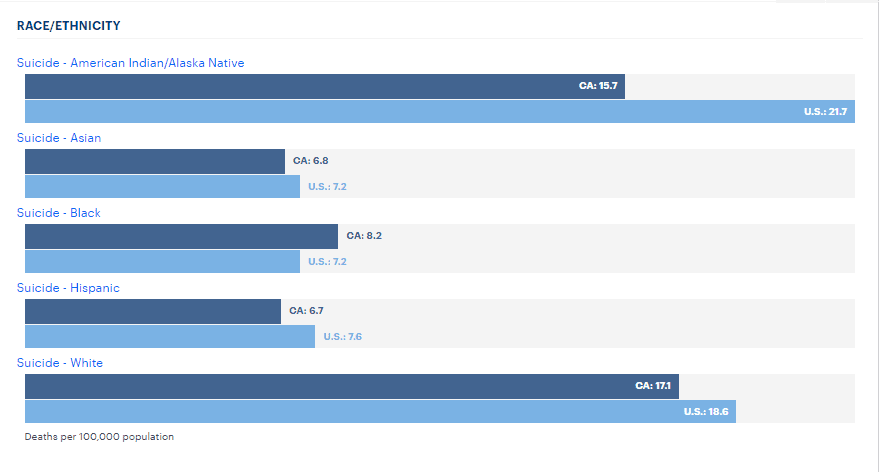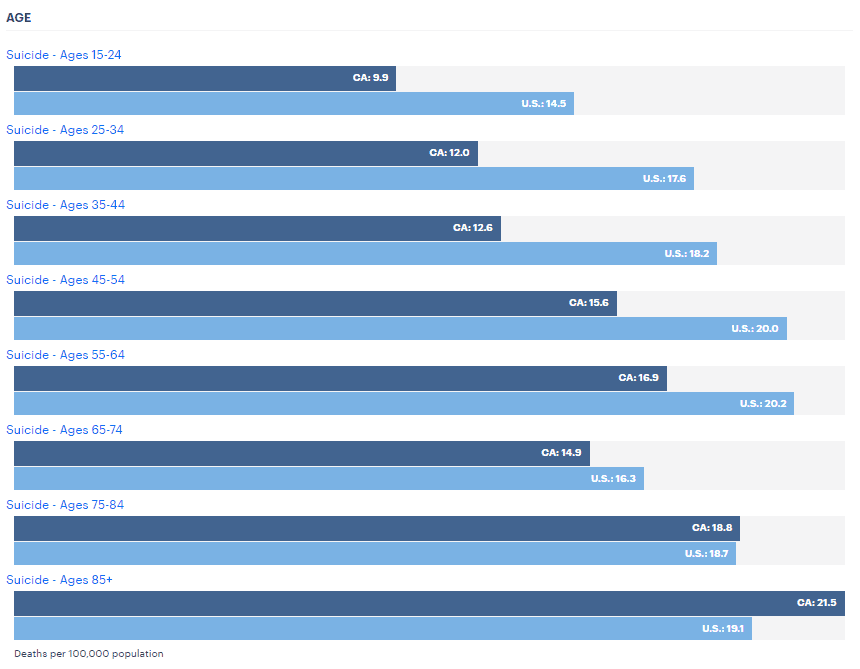SUICIDAL IDEATION TREATMENT CENTER IN LOS ANGELES, CALIFORNIA

Suicide is the 10th leading cause of death in the United States and the 2nd leading cause of death in people between 10-34. The gravity of the situation can be seen in the fact that every 11 minutes, one person loses their life to suicide. Get help today at California’s leading suicidal ideation treatment center Overland IOP & PHP. If you are considering suicide or know of someone that feels suicidal, reach out for help and suicidal ideation treatment because you might save a life – your own or someone else’s. Unfortunately, many cases of suicide are not reported due to stigma, religion, and other concerns. Hence, the actual picture may be even darker than statistics shows.
Populations with disproportionately high suicide rates include:
- Males have a suicide rate 3.7 times higher compared with females.
- American Indian/Alaska Native individuals have the highest suicide rates in the nation, followed by non-Hispanic white individuals. Suicide rates among Hispanic, Black, and Asian/Pacific Islander individuals are significantly lower than rates among American Indian/Alaska Native and white individuals.
- Older adults have a higher suicide rate when compared with younger adults and adolescents. By age and gender, the highest suicide rate is among males ages 65 and older, followed by males ages 45 to 54. Among females, those ages 45-54 have the highest rate, followed by those ages 55-64.
- Suicide rates among veterans were 1.5 times greater than non-veterans, after adjusting for age and gender in 2016.
- Those living in rural areas compared with those living in urban areas.
- LGBTQ adults and youth compared with heterosexual adults and youth.
Understanding the issues concerning suicide and mental health is a meaningful way to participate in suicide prevention, help others in crisis, and change the conversation around suicide. If you are having suicidal thoughts, contact the National Suicide Prevention Lifeline:
1-800-273-8255
1-888-628-9454 (En Espanol)

What Is Suicidal Ideation?
“Suicidal ideations,” often called “suicidal thoughts,” is a broad term used to describe a range of contemplations, wishes, and preoccupations with death and suicide. Suicidal ideation is one of the symptoms of depression, anxiety, bipolar disorder, and some other mental health illnesses. But it may occur in people with no mental illness at all.
Not everyone with suicidal ideation acts on it. There are two kinds of suicidal ideation: passive and active. Passive suicidal ideation occurs when a patient wishes that they were dead or could die, but the patient doesn’t have any plans to commit suicide.
Active suicidal ideation, on the other hand, is not only thinking about it but having the intent to commit suicide, including planning how to do it.
If you or a loved one has suicidal ideation with a mild to moderate risk level, you should get help at an outpatient mental health facility, like Overland Mental Health. If you have active suicidal thoughts or plans, contact the National Suicide Prevention Lifeline at 1-800-273-8255. If you or a loved one are in immediate danger, call 911.
California Suicide Statistics
Suicides in California increased 7% between 2009 and 2018 from 10.7 to 11.5 deaths per 100,000 population.

California Suicide Statistics By Sex

California Suicide Statistics By Race/Ethnicity

California Suicide Statistics By Age

Suicidal Ideation Treatment At Overland Mental Health In Los Angeles, California
Suicide, the act of taking one’s own life, is a terrible reaction to stressful life situations. What makes suicide even more tragic is that it can be prevented and treated. If you are considering suicide or know of someone that feels suicidal, reach out for help and treatment because you might save a life – your own or someone else’s.
When someone arrives at Overland with suicidality issues, patients are immersed in our safe treatment settings, where they are closely watched and evaluated repeatedly for their level of suicidality. At Overland, we treat suicidal ideations in several manners based on a personal approach to each patient. We offer IOP and PHP programs and different psychotherapeutic modalities to treat suicidal ideations effectively.

Suicidal Ideation Treatment: Suicidal Ideation Assessment
Patients at Overland are asked to contract for safety (suicidal assessment). During an evaluation, patients are asked to rate the intensity of their urges, whether they have a plan, whether they have the means to carry out their plan, and whether they intend to make an attempt. Patients are also asked about previous suicidal thoughts and attempts.
Following the assessment, the patients are asked to sign our written contract for safety, which is a verbal agreement to remain safe. This contract explains our rules around suicidality and what will happen if a client makes a suicide attempt (for example, transfer to a higher inpatient level care facility).
Suicidal Ideation Treatment: Individual therapy
Individual sessions can be used to help explore the reasons that may have led to the development of your suicidal thoughts. At our clinic, you and your therapist can work through the causes of your emotional pain and help you learn healthier ways of dealing with stress, triggers for relapse, and ways to handle suicidal urges.
Suicidal Ideation Treatment: Group therapy
Different groups are held in the morning, afternoon,s and evenings every day and cover a wide range of topics. Through group sessions, patients connect with others while learning better communication skills. Group therapy sessions at Overland are facilitated by licensed and registered mental health professionals and addiction counselors.
Suicidal Ideation Treatment: Family therapy
Family therapy can help loved ones understand what you or your loved one is going through and allow family members to be a part of the healing process.
Suicidal Ideation Treatment: Medication Management
Our team evaluates patients to address their need for medication. Depending upon your circumstances, your treatment plan may include medication to ease the symptoms. Drugs such as antidepressants, anti-anxiety medications, or mood stabilizers can help reduce presenting symptoms, leading to a reduction in suicidal urges. All medication use at Overland is closely monitored and altered as necessary.
Suicidal Ideation Treatment: Psychotherapeutic Modalities
Patients at Overland are exposed to a wide array of psychotherapeutic modalities, which gives them a toolset to deal with strong feelings and mood changes. We have specific groups to address suicidality, including Seeking Safety and Process Groups. Cognitive-behavioral therapy, or CBT, may also be used to reduce feelings of hopelessness and suicide attempts. Dialectical behavioral therapy can be used to manage overwhelming feelings that can lead to suicidal ideation.
Updated 04/13/2022

Overland is the top-rated mental health, addiction, and codependency treatment center in Los Angeles, California. We provide IOP, PHP programs and in-person, virtual care (telehealth services), hybrid treatment plans.
If you have suicidal thoughts, but there is no crisis, you might benefit from an IOP or PHP program that can help reduce the risk of suicide. Inpatient hospital care might recommend this if you or your loved one think about suicide often and if the thoughts last a long time or include a suicidal plan to die by suicide.
Contact Overland IOP today via phone, live chat, contact forms, or email! We work 24/7 and provide in-person, virtual care (telehealth services), and hybrid treatment plans. Our IOP and PHP programs offer morning, afternoon, or evening options. Start your treatment as soon as the same day!
Published: September 21, 2021

Published: February 14, 2026
Medication-Assisted Treatment (MAT): How It Works?
Summary: Medication-assisted treatment (MAT) is an evidence-based approach to addiction treatment that combines FDA-approved medications with behavioral therapy and counseling to treat substance use disorders — primarily opioid and alcohol addiction. MAT is endorsed by the Substance Abuse and Mental Health Services Administration (SAMHSA), the National Institute on Drug Abuse (NIDA), and the World Health […]
Read more
Published: February 06, 2026
Talk Therapy: Types, Benefits & How It Works in California
Summary: Talk therapy — also known as psychotherapy — is a structured, evidence-based treatment approach in which a trained mental health professional helps individuals identify, understand, and change the thoughts, emotions, and behaviors that contribute to mental health conditions and substance use disorders. It is the foundation of treatment for depression, anxiety, PTSD, personality disorders, […]
Read more
Published: January 27, 2026
What Is DPD? Understanding Dependent Personality Disorder
Most people don’t ask, “What is DPD or Dependent Personality Disorder?” They come in feeling drained, anxious, and stuck in relationships that feel restrictive yet hard to leave. Being alone feels unsettling. Decision-making feels paralyzing. Reassurance becomes a daily necessity rather than a comfort. At Overland IOP in Los Angeles, we often see Dependent Personality […]
Read more
